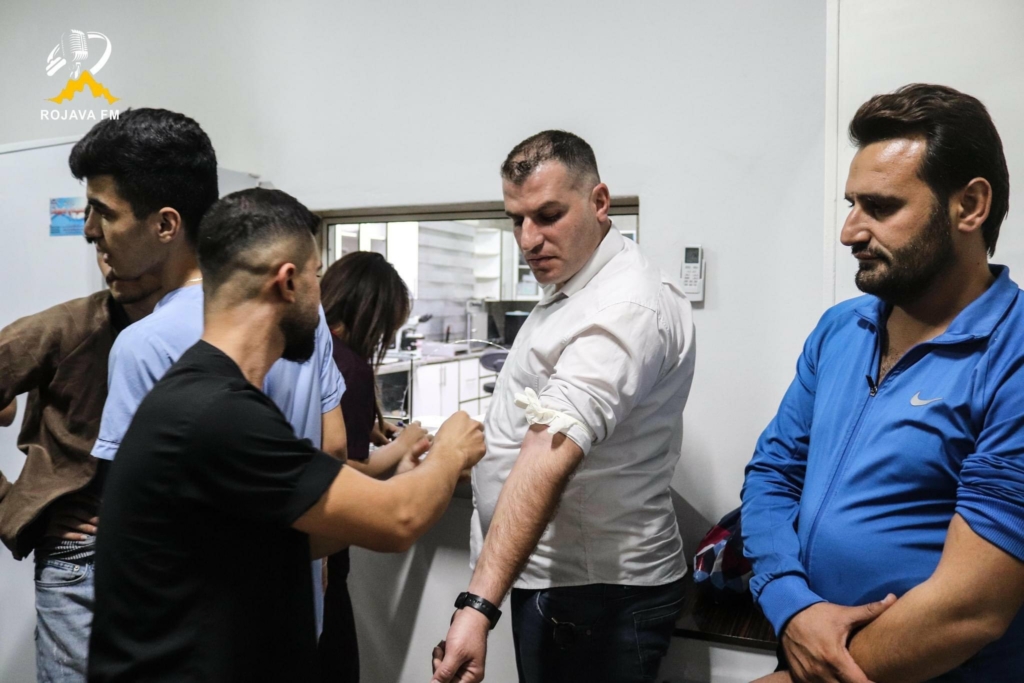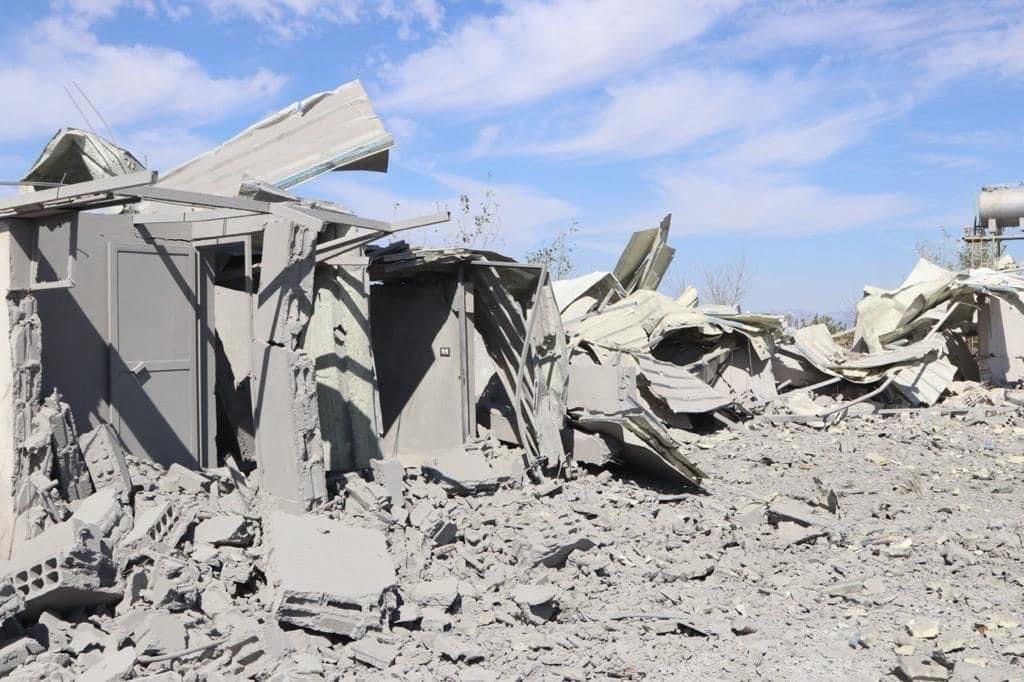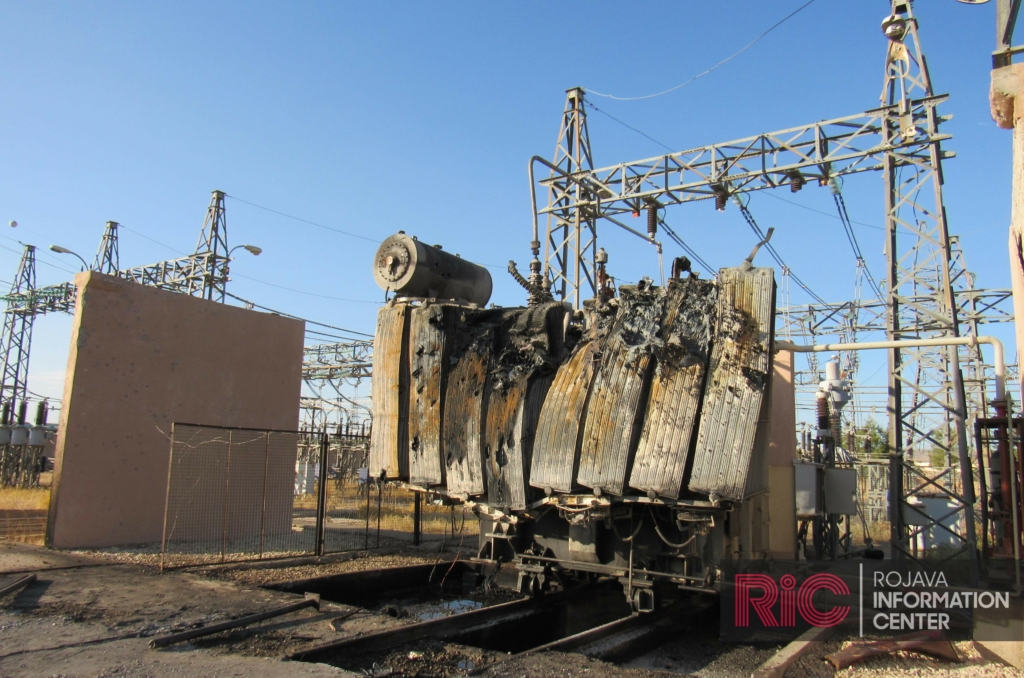Turkey is trying to bomb Rojava out of existence
Sarah Glynn of Scottish Solidarity with Kurdistan writes for Bella Caledonia
That little click. I check WhatsApp. ‘Just now drone attacks next to my house – was bloody scary’. Only two hours earlier my friend had been sending me photographs of his village near Kobanê. Now Turkey’s latest assault had caught up with him too.
Since Thursday morning, Turkey has accelerated their campaign to destroy the Autonomous Administration of North and East Syria. This is the region that combines predominantly-Kurdish Rojava and the adjacent majority-Arab lands that Kurdish forces liberated from ISIS. It covers around about 30% of Syria and provides home to some five million people. Thwarted, by the United States and Russia, from carrying out another invasion, Turkey is attempting to destroy the Autonomous Administration by making the life of its people impossible.
Constructing and running a new society is slow and difficult work, especially when your land has been ravaged by ISIS and your neighbours blockade your borders. But destroying a society’s security and means of subsistence is simple. Bomb the power stations and substations so millions are left without electricity and there is no power for hospitals, for water pumps, for bakeries, and for the myriad other things that we take for granted. Bomb the gas bottling plant that everyone relies on for the fuel to cook their food and to heat their homes in the winter. Bomb the oil fields that not only provide vital fuel but are also the main source of revenue to support the services of daily life. Bomb grain silos, just filled with this year’s harvest. Bomb factories to decimate an economy already struggling to get off its feet. Bomb hospitals and homes so people know that nowhere and no one is safe. Turkey is doing all of these things.

Qamishlo residents queue to donate blood for the wounded
A pre-announced war crime
This is illegal, of course, under international law. Targeting civilians and civilian infrastructure is regarded as a war crime. But Turkey has been committing war crimes for a long time without any comeback. International opprobrium depends on who you are and your political leverage, not on what you do. Turkey bombed the region’s vital infrastructure a year ago too, though not as thoroughly as now. Since the beginning of 2021, they have cut the flow of water in the Euphrates, and, since their 2019 invasion, their mercenaries have repeatedly shut down the pumping station that supplies water to Hasaka. They have performed targeted assassinations of key Administration figures, and shelled villages to drive away their inhabitants. They have committed the biggest war crime of all in carrying out unprovoked invasions, and they have empowered and supported groups that have performed the most gratuitous and brutal atrocities.
Turkey even announced their intention to commit their latest war crime in advance. On Wednesday, the Turkish Foreign Minister, Hakan Fidan, declared that all the region’s infrastructure was a legitimate target. According to international law, essential infrastructure is never a legitimate target.

Covid hospital, Derik
A convenient pretext
So, what was Turkey’s excuse and what was their reason? Two different questions with different answers.
If you were to believe Fidan, this is a legitimate response to the action last Sunday by two members of the PKK, who carried out a suicide attack on the entrance to the police headquarters attached to the Interior Ministry in Ankara, wounding two policemen. Fidan claims, on behalf of the Turkish Government, that the PKK men came through North and East Syria, and that there is no distinction between the PKK and the Peoples Defence Units (YPG), the Syrian Kurdish forces that are now part of the Syrian Democratic Forces, or SDF. Turkey’s attack is thus presented as pre-emptive defence in the fight against terrorism, for which, as the United States has demonstrated, almost anything is permissible. Fidan actually referred to ‘YPG infrastructure’ as though the armed forces and civilian society were one and the same.
Every step of Fidan’s argument is problematic. The Turkish Government has produced no evidence that the men came through Syria, and their presence there has been denied by both the SDF and the PKK. It is no secret that the Autonomous Administration of North and East Syria is inspired by the ideas of PKK leader, Abdullah Öcalan, and the YPG includes fighters who have previously fought for the PKK – including the man who now commands the SDF – but the YPG and PKK are separate organisations. The YPG operates inside Syria and has never threatened Turkey. Turkey likes to quote article 51 of the UN charter, which describes the right to self-defence. There has been extensive debate over whether this includes pre-emptive action, but even where this is deemed acceptable, customary law demands that for an action to be regarded as self-defence, it must be necessary, without other alternatives, and proportional. Turkey’s pulverisation of North and East Syria does not pass this test, and is very far from proportional.
A useful pretext
It is clear that Turkey has been looking for an excuse for this aggression, and that if the PKK had not attacked, they would have used something else – or even created an incident themselves. Fidan is notorious for having been caught on tape in 2014 (when he was head of Turkey’s National Intelligence Organisation) proposing a missile strike on Turkey to make up a case for war. A year ago, Turkey justified similar, though less intensive, attacks on North and East Syria by blaming the YPG for a bomb attack in Istanbul that appears to have been linked to militant Islamists – certainly not the YPG or PKK. Turkey’s aggression would still have happened sometime without the PKK attack, and cannot be blamed on the PKK – though some will try and do so, which can only benefit Turkey.
The PKK’s attack has also been used to justify the round-up and detention of around 250 largely-Kurdish activists within Turkey itself, including many members of the pro-Kurdish leftist Peoples’ Democratic Party, the HDP. There is no reason to assume that any of them had anything to do with the attack. This is simply a bigger version of what has been happening every week, when Kurdish activists are detained for absurd and petty reasons under Turkey’s endlessly elastic terrorism act.
Turkey’s war on the Kurds
And what of the real reasons behind Turkey’s violence? The answer to this question begins 100 years ago when ethnic nationalism was made a doctrine of the new Turkish republic. Kurds were expected to turn themselves into Turks and forget about their own culture, which was harshly suppressed, and generations of Turks have been indoctrinated with anti-Kurdish rhetoric. For four decades now, the PKK, led by Abdullah Öcalan, has fought a war against the Turkish state. They succeeded in replacing the Kurds’ internalised oppression with a proud Kurdish consciousness, but not in winning external freedom. Many times during this period, the PKK has declared a unilateral ceasefire and attempted to negotiate a peace settlement, and sometimes there have been talks, but the Turkish authorities have not proved ready to allow the Kurds a dignified existence. Since the 1990s, there have also been pro-Kurdish political parties in the Turkish parliament, but their MPs and activists face harassment and imprisonment, while successive parties have been banned and closed down. The most recent peace talks took place between 2013 and 2015, when there was a real sense of hope in the air. But President Erdoğan saw that this was winning support for the HDP rather than for himself and his party, and that, at the same time, Kurds across the border were beating back ISIS and strengthening their autonomous control over northern Syria. He repudiated the initial agreement in order to pursue a military ‘solution’ to the Kurdish Question, which he has been doing with increasing vengeance. A century of ethnic nationalism has made Kurd bashing a central plank of Turkish populism, and the hopes raised by the main opposition party for a gentler politics did not even last into the second round of the presidential election. Rallying against the Kurds has become a substitute for addressing Turkey’s severe economic and social problems.
Erdoğan has always viewed the existence of an autonomous region in Kurdish Syria as a threat, and he will not rest until it is eliminated. It has never been a physical threat, but does indeed pose a political threat to the status quo by providing an example of a multicultural feminist democracy inspired by Öcalan’s ideas. While ostensibly supporting the coalition against ISIS, Turkey has given ISIS assistance – not least in enabling the passage of thousands of foreign fighters – in the hope that they will put an end to regional, and especially Kurdish, autonomy. And Turkey has twice invaded the region with the help of brutal Islamist militias, to whom they have given control over the occupied lands. Despite US and Russian negotiated ceasefires, Turkey has not stopped their low-level war of attrition against the Autonomous Administration, and if the US and Russia had not refused to move out of the way, Turkey would have carried out another land invasion.
Russia is in Syria to support the Syrian Government in the civil war. They don’t want to see more land occupied by Turkey, but are happy for Turkey to weaken the Autonomous Administration, which they want to force back under President Assad’s centralised control. America initially intervened in Syria by supporting opposition groups who they hoped would bring about regime change – the same violent groups that are still supported by Turkey. But when these proved unreliable partners, and when ISIS threatened to create a centre of anti-Western violence, the US moved to support the YPG (and women’s YPJ) which was the only force providing effective resistance to ISIS.
America has always supported the Turkish Government against the PKK, but American troops are now also in a military partnership with the SDF (which includes the YPG). Turkey is determined to break that partnership and to persuade America that the YPG and PKK are one and the same, which is another reason for them insisting that the PKK men came from Syria.
However, that US-SDF partnership is limited to the fight against ISIS, which still retains many sleeper cells. America will not help the SDF defend themselves against Turkey, which is a NATO ‘ally’. Nor will they allow them the anti-aircraft weapons they need to defend themselves, even though the insecurity created by Turkey’s attacks is a gift to ISIS recruiters.
Last week, for the first time, the US brought down a Turkish drone. Of course, that particular drone was seen as threatening an American base, and the incident was followed by top-level phone diplomacy between the US and Turkey. This sent a message that the US was not going to move out of the way, as Turkey had demanded, but all Turkey’s other drones and military aircraft were left free to destroy the life and lives of the people of North and East Syria. There have been protests against lack of action by the US, which is supposed to be a guarantor of Turkey’s ceasefire.
Neo-Ottoman dreams
Erdoğan feels no need to hide his plans. Shortly before Turkey’s 2019 invasion, he held up a map of Syria at the United Nations General Assembly that showed a 30km deep strip all along the Turkish border, over which Turkey demanded control. This strip included the main Kurdish areas as well as some of Syria’s most fertile land. Erdoğan called it a ‘safe zone’, claiming it was necessary to prevent the YPG from attacking across the border. In fact, the YPG has never shown any intention of attacking Turkey, and the areas Turkey captured in 2019 have become some of the most dangerous places on earth. Kurds and other minorities have learnt to flee rather than try and survive under Turkish occupation. In a deliberate policy of demographic change, they have been replaced by families of Islamist militias and by refugees from other parts of Syria forcibly deported from Turkey.
When Turkey’s modern borders were agreed in the Treaty of Lausanne, 100 years ago this year, the Turkish delegation based their negotiations on a document entitled the National Pact, drawn up in 1919-20, which claimed for Turkey all those areas with an ‘Ottoman Moslem majority’. This included the predominantly Kurdish regions that the treaty subsequently awarded to Iraq and Syria. There was no separate Kurdish delegation at the Lausanne negotiations, and it was only after the Turkish republic was founded that its leaders made horribly clear that this was solely a Turkish project and not a joint Turkish-Kurdish one. For Erdoğan, the National Pact is still on the table, and his irredentist dreams for the ‘Turkish Century’ also inform his desire to control the belt of land south of the Turkish border.

Electricity station, Qamishlo
A future in ruins
After three days of bombardment with drones and warplanes, accompanied by intense shelling of border areas, the devastation Turkey has caused is cataclysmic. Places that have been working hard to recover from the damage caused by ISIS have seen all their hard work destroyed and more. Rebuilding will be difficult and slow, and always under the shadow of a possible repeat attack. The damage to the Suwayda gas plant alone has been estimated at over $50 million, and essential parts are difficult to get under boycott.
There have been at least seventeen people killed and many others wounded, and the psychological toll of these never-ending attacks is impossible to measure.
The determination and resistance that defeated ISIS remains strong, but if the administration is prevented from being able to meet people’s basic needs, dissatisfaction may grow among those less committed to their democratic and feminist project, especially in more tribal areas such as Deir ez-Zor. This is, of course, part of Turkey’s plan.
When I spoke to my friend in Kobanê on Sunday morning all was quiet. Unlike in Qamishlo, they still had power, though only in late afternoon and evening as water levels have become so low that the turbines can’t function fully. People in Kobanê have become used to drone attacks. Their biggest fear is another invasion and being displaced again, as at the time of ISIS. No one can start new projects: they can’t even plan for the next day. There is a sense that the future is out of their hands, and only God will protect them.
As I finish writing this on Sunday night, Turkey’s bombardment continues along the whole border region, and calls are going out from the hospitals for people to donate blood for the wounded.
Published on 9 October 2023 and republished from Bella Caledonia: https://bellacaledonia.org.uk/2023/10/09/turkey-is-trying-to-bomb-rojava-out-of-existence/
Main image: Kobane Friday 6 October 2023
